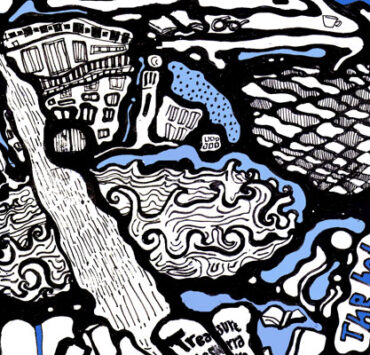Last night I saw Rohit again. I saw him walking on the campus lane, carrying a framed oil painting of Ambedkar under his left arm, blasé but careful in his carriage. Though what he really was, was tired. Apart from that he wasn’t anything much. He used to puzzle me.
“Are you okay?” he asked me. I just shrugged.
“Maybe it is the heat,” I said. “It is too warm for August.”
“Nature is a mystery,” he smiled.
“Or maybe not. Global warming, climate change. We did it.”
“It is still a mystery.” He produced a short hollow laugh which sounded like a snort. “We can explain exactly how it all happened. And we can shout slogans against it. But what’s the point? Where does it lead?”
I could not see his face. But I knew he was not smiling anymore.
“To a better world?” I ventured.
“I guess.” But his voice was small, unconvinced. And I didn’t really want to face his questions, or my own. So we just walked on in silence.
* * *
Another time, I think I caught a glimpse of him while he was shouting his slogans.
“What a hypocrite!” my angel friend said.
“If protests are so pointless, why do you participate?” I asked him later.
He laughed and replied, “Well, someone has got to speak up. For a better world.” He winked. “Look we did get an apology from A.B.V.P.”

‘I wanted to be a writer.’
“What a hypocrite!” my angel friend repeated.
We were outside, sitting on the edge of the rain gutter. It was balmy still. Stale. Not a breath of fresh air. No breeze. No movement. A day of intense activity, of glorious victory had brought forth a rather still night.
“Still, but not peaceful,” he tiptoed into my thoughts and swept them gently.
“Are you sad?” I asked.
“Being sad is not the problem. Sadness is human nature.” He paused for a moment. “But I am not sad. I feel like I am looking for something, but I am not quite sure what.”
“Hmmm… yes.” I was trying to breathe, so I justified: “But don’t we all feel that way?”
“Restless?”
“Yeah?”
“Do you? I would have thought today’s success would bring calm. It has not. Nothing’s really changed.”
I laughed. “Ha-ha! You sound like the protagonist of a Shakespearian tragedy.”
“I don’t know any Shakespeare,” he said. “Why don’t you tell me?”
So I did. I told him about Brutus and Macbeth. But mostly about Brutus, because he was a man of such high ideals. And he listened keenly. I think he liked stories. At the end of it, he said, “What a lonely life this Brutus must have led.”
I thought it was strange of him to pick, of all the glamour in the story, on that. So I said, “I thought you might have found it comforting, to know that others have felt the same way. I thought it would be the opposite of lonely.”
“But Brutus killed himself, didn’t he? Ha-ha!” He was amused I think. It was a real laugh.
Then he said: “I wonder if I can recover from my childhood loneliness. The unappreciated child from my past.” A momentary silence. “You asked me why I go to protests? Well, here’s what: it makes me feel less alone. They are nice people at A.S.A., they treat me well, they love me very much. When I am with them, I feel like part of something, a family.”
“Ha-ha! And what about your better world crap?”
He smiled. “Well, it doesn’t hurt.”
“Then what’s bothering you? When you have a family?”
“Well,” he began, “Like in all families, there are some things you don’t talk about. You talk about victories and failures, but you don’t about satisfaction. Or absence of peace. I can’t tell them nothing’s changed. They would listen, but I don’t think they would really understand it in the way I mean it.” He looked troubled and childlike. “I don’t know,” he finally said.
“Don’t think too much,” I pushed on, feeling smugly triumphant at last.
“God, that’s the lamest advice I have ever received!” His tone was harsh and I could sense a sudden flare of anger in him. He let his body fall, lying on his back across the gutter, his eyes looking at the sky. “Dammit, you can’t even see stars in this city!”
My moment of smugness dissipated like dew drops on a glass window do when someone blows on it. His abrasiveness had hurt me. And my books felt useless and disappointing in its face, and that hurt me as well. So instead of reaching out for my soul, I blamed my books. And the human condition. And circumstances of life. I blamed the senselessness of it all in that moment. It was easier to do. Waldo Emerson would not have been proud of me then. I could not get over myself enough.
“I love science, stars, nature.” He was talking again. “I love people.” He paused. “I miss them.”
“I am right here,” I said. “I am people.”
“Yes. So am I. I miss me.” He continued, “I, like you, and like people, have long been divorced from nature. Our feelings are second-hand. Our love is constructed. Our beliefs are coloured, our originality validated through artificial art. It has become truly difficult to love without getting hurt.”
“I won’t hurt you,” I said in an attempt to get over my hurt.
He looked at me, half-smiling, and then back to the vacant sky. “Yet I already did,” he replied. A sigh. “I feel so empty sometimes. Not hurt, nor sad. Just empty. I wanted to be a writer. But now, I am mostly just unconcerned about myself. It is pathetic.”
I touched his hand and he touched it back, so I let it stay there.
He continued, “Stars are so beautiful. They make you feel magical and so tiny all at the same time. Like people.” His eyes were far away, recalling a memory. Perhaps a few of them. “I miss them both. I miss them so much! It is strange to miss something I never saw and never had in this way, isn’t it?”
He paused for a breath, and to search for some nature in that artificially validated canvas above him. “I have only known the value of a man being reduced to his immediate identity and nearest possibility. A dalit, a Ph.D. scholar, heh. To a vote. To a number. To a thing. Fellowships, money. Never is a man treated as a mind. As a glorious thing made up of star dust. In every field: in studies, in the streets, in politics, and in dying and living.”
“You are a writer. A poet.” I bent over his face to kiss his corpse. “Don’t die. Please…”
He didn’t. He just was. Neither a coward, nor a martyr, and no saint. Not selfish. He just was. “Let my funeral be silent and smooth,” he told me. Let it just be.
The police forcibly took his body and cremated it secretly today.
* * *
Last night, this morning, I saw him again. I did not know him, but he came to me as a ghost. And he haunts well, heh. I must say that. He does haunt well. He has a great sense of humour, a lightness which only ghosts like him can bring. He travels to the stars and back, and he is laughing at us. Not derisive, not mocking. Just thoughtful, playful.
Rohit’s last wishes, conveyed in a letter, were this: “If you, who is reading this letter, can do anything for me, I have to get seven months of my fellowship; one lakh and seventy-five thousand rupees. Please see to it that my family is paid that. I have to give some 40-thousand to Ramji. He never asked them back. But please pay that to him from that.
“And do not trouble my friends and enemies on this after I am gone.”







